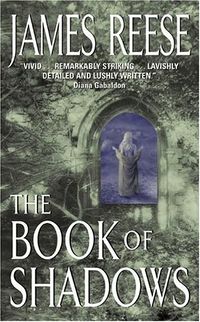On November 27th, 2022, the 8,000th article was added to the SuccuWiki!
The Book of Shadows (Novel)
| The Book of Shadows | |
|---|---|
 The Book of Shadows Book Cover, written by James Reese | |
| Author(s) | James Reese |
| Language |
German English |
| Publisher |
William Morrow (Hardcover) William Morrow (Paperback) HarperTorch (Mass Market Paperback) HarperCollins (eBook) |
| Publication date |
February 19, 2002 (Hardcover) February 19, 2002 (Paperback) December 3, 2002 (Mass Market Paperback) October 13, 2009 (eBook) |
| Media type |
Hardcover Paperback Mass Market Paperback eBook |
| Length |
468 Pages (Hardcover) 640 Pages (Paperback, Mass Market Paperback, eBook) |
| ISBN | 978-0061031847 |
| ASIN | B000FCKBIO |
For other uses of the word Succubus, see Succubus (disambiguation).
The Book of Shadows is a book written by James Reese. Within this tale of magic and sorcery, Succubi appear throughout the novel.
Overview
- Title: The Book of Shadows
- Author: James Reese
- Format: Hardcover, Paperback, Mass Market Paperback and eBook
- Length: 468 Pages (Hardcover) 640 Pages (Paperback, Mass Market Paperback, eBook)
- Publisher: William Morrow (Hardcover)
William Morrow (Paperback)
HarperTorch (Mass Market Paperback)
HarperCollins (eBook) - Language: German and English
- ASIN: B000FCKBIO
- ISBN-10: 0061031844
- ISBN-13: 978-0061031847
- Release Date: February 19, 2002 (Hardcover)
February 19, 2002 (Paperback)
December 3, 2002 (Mass Market Paperback)
October 13, 2009 (eBook)
Plot Summary
A sinuous plot studded with uncanny surprises snakes through this nontraditional period gothic. Its first-person narrator, Herculine, seems cut from the same cloth as the heroines of classic sensationalist fiction: vulnerable, tragically orphaned and, at the tale's outset, immured in the tedious routines of early 19th-century French convent life. But Herculine's self-consciousness about unnamed physical endowments suggests an unusual heritage whose dimensions become known when a schoolgirl prank leads to shocking revelations of the "unnatural" and accusations of witchcraft.
Before she can be tried, she is spirited to safety by witch Sebastiana d'Azur, a "Soror Mystica" who tutors her in the enchantments necessary for Herculine to fulfill her destiny: to liberate Father Louis and his lover, Madeleine de la Mettrie, two elemental spirits chained to earth. Herculine's instruction proves a pretext for relating elaborate 18th-century chronicles of Louis's trumped-up trial for witchcraft and Sebastiana's tutelage in the mysteries of the Craft, and it is through these tales that the novel comes into its own.
Book Review
The following review, written by the author of this book can be found at the Amazon.com link in the External Links Below
- 1 out of 5 stars
- Disappintingly Plotless
- Reviewed On: April 25, 2002
- Reviewed By: Steven J. Rickard
I was so disappointed with this novel. It started off well, but almost immediately, began to read like something put together from three or four different gothic-style bodice-busters. Characters and items appeared, apparently of some importance, but then disappeared without making any impact upon the plot. Things like this happen throughout the novel, accompanied by frustrating affectations in the writing style. For instance, why refer to some of the fictional places and even characters by first initial only, or a blank line (i.e. "C________ " or "_______'s") but not all of them? Why do it at all? It's not as if the novel is presented as nonfiction.
The protagonist begins an irritating number of sentences with the word "yes." Yes, it gets annoying after awhile, as do the nearly constant italicized words ("I took it all in . . . so kind she was . . . so grand it was . . . doesn't that make for a pretty picture.) I started rolling my eyes in frustration over the breathy, airheaded tone the sentences took on in my head.
I think I was primarily disappointed in this novel because it contains a lot of truly promising elements: the mysterious witches, erotic ghosts, dreadful death, poison, magic, and lots of sex -- but doesn't really have a story. Certainly, there are several different stories woven throughout the book, and one or two of them even thread their way through the novel. But, yes, at the end of it all, I wasn't really certain what the characters had been making such a fuss over.